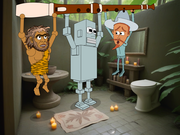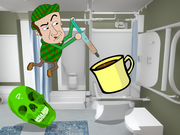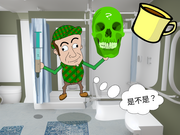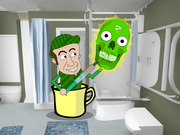big; large; great / older (than another person) / eldest (as in 大姐[da4 jie3]) / greatly; freely; fully / (dialect) father / (dialect) uncle (father's brother)
important / vital / to want / to ask for / will / going to (as future auxiliary) / may / must / (used in a comparison) must be / probably / if
to want; to need; to ask for / will; shall; about to / need to; should / if (same as 要是[yao4 shi5]) / (bound form) important
to be (followed by substantives only) / correct; right; true / (respectful acknowledgement of a command) very well / (adverb for emphatic assertion)
是
=
旦
+
龰
:
Mnemonic symbol: a skull, from "to be or not to be".
Sherlock Holmes (sh) starts his day in the space station's bathroom (Ø4) with a mug of coffee (旦). Holding a skull (mnemonic symbol for 是) in his hands, he asks himself "to be, or not to be" (是). He wonders if he can make the skull come back to life using lots of coffee, and injects coffee from his mug into the skull using a syringe (龰).
Sherlock Holmes (sh) starts his day in the space station's bathroom (Ø4) with a mug of coffee (旦). Holding a skull (mnemonic symbol for 是) in his hands, he asks himself "to be, or not to be" (是). He wonders if he can make the skull come back to life using lots of coffee, and injects coffee from his mug into the skull using a syringe (龰).
是
=
日
+
下
+
人
:
Mnemonic symbol: a skull, from "to be or not to be".
Sherlock Holmes (sh) watches the Neanderthal Man (人) trying to climb to the sun (日) on a ladder (下) in the space station's bathroom (Ø4). Sherlock is afraid that he'll open the window, so he puts on a big skull (是) and scares him off.
Sherlock Holmes (sh) watches the Neanderthal Man (人) trying to climb to the sun (日) on a ladder (下) in the space station's bathroom (Ø4). Sherlock is afraid that he'll open the window, so he puts on a big skull (是) and scares him off.
to hold / to seize / to catch / to apprehend / to take / (used in the same way as 把[ba3]: to mark the following noun as a direct object)
to obtain / to get / to gain / to catch (a disease) / proper / suitable / proud / contented / to allow / to permit / ready / finished
structural particle: used after a verb (or adjective as main verb), linking it to following phrase indicating effect, degree, possibility etc
to have to / must / ought to / to need to
得
=
㝵
+
彳
:
Because Don Quixote kicked the genie's lamp from the rooftop of the Erechtheion as far as to inside of the Eiffel Tower, the genie demands Don Quixote to apologize. Inside of the Eiffel Tower, Don Quixote kowtows to the genie, who takes back the black sneakers he gave to Don Quixote earlier.
(of sth) to move / to set in movement / to displace / to touch / to make use of / to stir (emotions) / to alter / abbr. for 動詞|动词[dong4 ci2], verb
at once / right away / only / just (emphasis) / as early as / already / as soon as / then / in that case / as many as / even if / to approach / to move towards / to undertake / to engage in / to suffer / subjected to / to accomplish / to take advantage of / to go with (of foods) / with regard to / concerning
(after a suppositional clause) in that case; then / (after a clause of action) as soon as; immediately after / (same as 就是[jiu4 shi4]) merely; nothing else but; simply; just; precisely; exactly / only; as little as / as much as; as many as / to approach; to move towards / to undertake; to engage in / (often followed by 著|着[zhe5]) taking advantage of / (of food) to go with / with regard to; concerning / (pattern: 就[jiu4] ... 也[ye3] ...) even if ... still ... / (pattern: 不[bu4] ... 就[jiu4] ...) if not ... then must be ...
to deliver / to carry / to give (as a present) / to present (with) / to see off / to send
送
=
关
+
辶
:
Mnemonic symbol: a delivery girl.
Inside of the engine's bathroom, the delivery girl gave a parcel to Susan Saint Bernard in passing since she can't stop her new electrical gladiator sandals. Susan Saint Bernard recognizes her demise and uses her spider-superpowers to push the off button of her sandals so that she can rest for a while.
Inside of the engine's bathroom, the delivery girl gave a parcel to Susan Saint Bernard in passing since she can't stop her new electrical gladiator sandals. Susan Saint Bernard recognizes her demise and uses her spider-superpowers to push the off button of her sandals so that she can rest for a while.
to / for / for the benefit of / to give / to allow / to do sth (for sb) / (grammatical equivalent of 被) / (grammatical equivalent of 把) / (sentence intensifier)
给
=
合
+
纟
:
Inside of the Eiffel Tower, a little silk worm is exceptional desperate, because she is unable to produce a silken thread. Fortunately Guy Fawkes has a solution: He gives her a tube of glue as a present, which he decorated with a little ribbon. With the glue, the silk worm is able to produce long sticky threads again.





